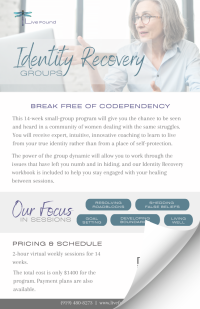Adapted from my presentation at the AACC 2018 Mega-National Conference given to counselors, pastors, church leaders and people-helpers. Though my clients most commonly represent the victim as women, we understand that men can be victims of abuse too. The pronouns in this article could be exchanged appropriately.
Understanding Misplaced Responsibility in Abuse
The Struggle to Speak Up
Many of my clients start their story by saying, “It has taken me a year (or more) to get the courage to speak up about this. I am so ashamed of letting myself stay in this abuse for so long!” They often feel a sense of misplaced responsibility, thinking they could have have seen and stopped it. Or that they should have been better, sexier, more fun, a better housekeeper, more submissive, more respectful. They often believe that if they were just less selfish, they could have made him happy. And I often hear it said, “If I had just done it differently, I could have figured this out and fixed it.”
The Reality of Responsibility
Reality is, she couldn’t have stopped it because he is responsible for his own behavior. Don’t imply that she could have done more to appease him. Or that she should have seen the red flags a long time ago, should have known better, or did something to cause this. She does not control his behavior. There is nothing she makes him do. He is in control of his own self. And yet, you will commonly see him “defer” to her by putting the burden on her to carry the load of the relationship and meeting his needs.
The Injustice of Power Dynamics
The thing is, it’s never okay to power over another person, to squash and suck the life out of them. Never. It doesn’t matter how it’s labeled or excused, bad behavior is bad behavior. And her spouse chooses to mistreat her out of his own free will. She doesn’t make him do anything. She is not complicit in his abuse. This is not 50/50 tit for tat. This is a man leveraging his power for his own gain.
The False Sense of Authority
Her husband has acted as if he is God, as if he has been given authority to shape her into what he wants her to be. He also often acts as if he is able to read her mind and that he knows her better than she does. He determines what is “best” for her and defines her dreams and ambitions. I’d even venture to say the church has taught him this is his role and that hers is to submit to this role. When she disagrees, he cries foul and calls her disrespectful, which again silences her so he can do what is right in his own eyes.
Healing and Reclaiming Responsibility
To work through healing from this kind of coercion and emotional control, help her separate her responsibility from his. Teach her how to identify manipulation and toxicity and to respond in ways that no longer enable the destructive cycle. Show her how to detach from taking responsibility for his choices and behavior and to be intentional about her own behavior so that she no longer reacts badly herself. You may also need to help her develop a safety plan for if/when her spouse ups the ante because it no longer gets him what he wants.
Rebuilding Self-Worth and Identity
Also, teach her how to listen to what she speaks over herself in her head. Help her get rid of the false agreements she has made. These come from the negative, accusatory scripts based on what he (and likely others in her life) have repeatedly spoken over her. Point her back to TRUTH. Ultimately, this means grounding herself in what God says of her, who God is to her, and what her purpose is according to Him. What did He design relationships to look like? Who is He, what is He like? And, how might that change what she has believed marriage was supposed to look like? Who has He designed, purposed, and called her to be? What gifts/talents has He given her to leave His mark on the world? Who is He shaping her into, as opposed to what her spouse is trying to do?
Overcoming the Biggest Hurdle
The biggest hurdle will be overcoming her sense of not even being worth the effort. We would love to help rebuild that sense of value! If you are a coach or counselor, let us help you plan an effective approach. If you are the one struggling with the confusion, let us untangle it with you. Schedule a session with one of our expert coaches today.


